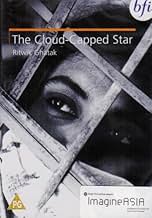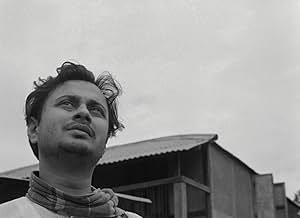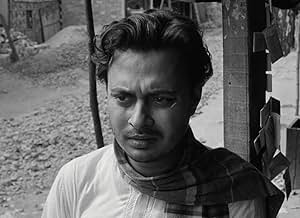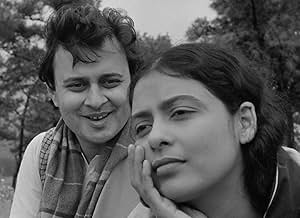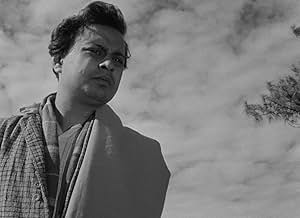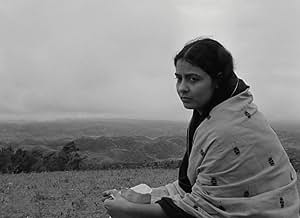IMDb-BEWERTUNG
7,8/10
3507
IHRE BEWERTUNG
Füge eine Handlung in deiner Sprache hinzuA selfless young woman (Supriya Choudhury) sacrifices her own happiness for her unappreciative family.A selfless young woman (Supriya Choudhury) sacrifices her own happiness for her unappreciative family.A selfless young woman (Supriya Choudhury) sacrifices her own happiness for her unappreciative family.
- Auszeichnungen
- 1 Nominierung insgesamt
Ranen Ray Choudhury
- Baul singer
- (as Ranen Chowdhury)
Empfohlene Bewertungen
If Satyajit Ray is the virtuoso of Indian cinema, Ghatak is the maverick. His films aren't as polished or subtle as Ray's, but he takes bold chances. Most blatantly in the sound design, with startling (and often beautiful) use of music, ambient noise, reverb, and effects that are almost sci-fi. Perhaps only Lynch is as distinctive in the employment of audio techniques. Not all of Ghatak's gambles pay off. Take, for instance, his insistence on casting the goofy Bijon Bhattacharya in most of his films. Bhattacharya's performance here isn't quite as damaging as his turn in THE GOLDEN THREAD, but it's easily the weakest aspect of the film. However, the primary focus is on Nita (Supriya Choudhury), the girl whose family walks all over her, and resent her for it in the process. As her brother chides her: "You'll suffer. Those who suffer, suffer forever." The family is a microcosm of Ghatak's obsession, the damage caused by the Partition, commenting on those who exploit the weak, and those who let themselves be exploited. It's high melodrama, but like Sirk, is done so artfully and effectively that it's a wonder to behold, with breathtaking images, unforgettable moments, and that idiosyncratic audio field.
One charge laid against the revered director Satyajit Ray was that, much like Kurosawa in Japan, his films weren't national or native enough, that they gave a Westerner's view of India, one moulded in Western forms, rather than something 'authentically' Indian. Another, related charge, is that he betrayed his subject matter - poverty, nature, repression, obsession etc. - by the fussy perfectionism of his style; David Thomson tells the story of Francois Truffaut, himself survivor of an impoverished, disruptive background, walking out of the aristocratic Ray's 'Pather Panchali', 'wearied by so much perfection'.
I don't know what 'authentically Indian' means; I certainly don't know whether authenticity, so grimly linked to nationalism, is a desirable aim. I suppose an authentically Indian film would not be an exquisite miniature, but a huge, sprawling, unstable, visceral film, full of rupture, sensation, violence, exoticism, noise, incongruity; but these views may be as inauthentically Western as any other. That said, 'The Cloud-Capped Star' seems to me to be a truer film than 'Pather', not necessarily as a representation of Indian experience, but of human experience, and certainly as a cinema experience, of which it is rare and overwhelming.
The irony is that the film is as replete with Western influences as Ray's. Director Ritwik Ghatak was a left-winger, and his film is a thrilling assault on mind and body, using many of the methods developed by Western leftists. The film is unashamedly a melodrama - the harrowing tale of a beautiful, clever, promising young woman who is mentally and physically broken by the relentless fending of a family alternately selfish and feckless.
Like the traditional melodrama , its primary appeal is emotional, as the heroine is battered by an inexorable series of crises, usually signalled by percussive frenzy in the music; characterisation is monochrome, the saintly goodness of the heroine contrasitng with the mean self-interest or cowardice of the rest.
But this is melodrama filtered through those of Douglas Sirk, who took this despised form and gave it a critical dimension. Not only does Ghatak use Sirkian devices - frames within frames, intrusive decor, 'unrealistic' lighting - but he takes the idea of the hysterical body to its limits - just as a character who must repress her emotions betrays them in physical pressures, so the repressions of character and narrative are displaced onto the form of the film, which is full of violent jump cuts, extreme clashes of composition, space and editing, deliberate dis-integration of musical numbers, a radical use of lighting and sound (including bizarre sci-fi whinings), taken to an extreme unavailable to Sirk in Hollywood, giving the film a formal hysteria that is reminiscent of another Sirk admirer, Godard. Did Ghatak see the contemporary 'A Bout De souffle' as he made this film? (I can imagine a tyro cineaste getting the same life-changing excitement from 'Star' as I did from the Frenchman when I was young).
The use of looming close-ups and rushes of blitzkrieg montage recall Eisenstein. The story of a family and a society is reminiscent in its breadth of a Victorian novel, while the schematic, almost scientific analysis of a victim placed in a very carefully observed social context reminds me of Zola. The spiritual power of the heroine's decline is even more staggering than Bresson (although, it's always women, isn't it?).
And yet, for all these formal influences, there is a faith in character missing (deliberately) in these masters, a psychological acuity mirroring the political anger. And if the film is beautiful, it is never complacently so: it is a beauty repeatedly violated, creating a new, modern beauty. Why has this film never made Top Ten lists?
I don't know what 'authentically Indian' means; I certainly don't know whether authenticity, so grimly linked to nationalism, is a desirable aim. I suppose an authentically Indian film would not be an exquisite miniature, but a huge, sprawling, unstable, visceral film, full of rupture, sensation, violence, exoticism, noise, incongruity; but these views may be as inauthentically Western as any other. That said, 'The Cloud-Capped Star' seems to me to be a truer film than 'Pather', not necessarily as a representation of Indian experience, but of human experience, and certainly as a cinema experience, of which it is rare and overwhelming.
The irony is that the film is as replete with Western influences as Ray's. Director Ritwik Ghatak was a left-winger, and his film is a thrilling assault on mind and body, using many of the methods developed by Western leftists. The film is unashamedly a melodrama - the harrowing tale of a beautiful, clever, promising young woman who is mentally and physically broken by the relentless fending of a family alternately selfish and feckless.
Like the traditional melodrama , its primary appeal is emotional, as the heroine is battered by an inexorable series of crises, usually signalled by percussive frenzy in the music; characterisation is monochrome, the saintly goodness of the heroine contrasitng with the mean self-interest or cowardice of the rest.
But this is melodrama filtered through those of Douglas Sirk, who took this despised form and gave it a critical dimension. Not only does Ghatak use Sirkian devices - frames within frames, intrusive decor, 'unrealistic' lighting - but he takes the idea of the hysterical body to its limits - just as a character who must repress her emotions betrays them in physical pressures, so the repressions of character and narrative are displaced onto the form of the film, which is full of violent jump cuts, extreme clashes of composition, space and editing, deliberate dis-integration of musical numbers, a radical use of lighting and sound (including bizarre sci-fi whinings), taken to an extreme unavailable to Sirk in Hollywood, giving the film a formal hysteria that is reminiscent of another Sirk admirer, Godard. Did Ghatak see the contemporary 'A Bout De souffle' as he made this film? (I can imagine a tyro cineaste getting the same life-changing excitement from 'Star' as I did from the Frenchman when I was young).
The use of looming close-ups and rushes of blitzkrieg montage recall Eisenstein. The story of a family and a society is reminiscent in its breadth of a Victorian novel, while the schematic, almost scientific analysis of a victim placed in a very carefully observed social context reminds me of Zola. The spiritual power of the heroine's decline is even more staggering than Bresson (although, it's always women, isn't it?).
And yet, for all these formal influences, there is a faith in character missing (deliberately) in these masters, a psychological acuity mirroring the political anger. And if the film is beautiful, it is never complacently so: it is a beauty repeatedly violated, creating a new, modern beauty. Why has this film never made Top Ten lists?
Gorgeous cinematography, attractive cast, fantastic music. Seriously, I wish I could find the soundtrack for this one. The voices are like musical instruments, full of feeling, and whether we see a performance as a break in the action or hear music and sound effects in the background, it always has an aching, haunting sense to it. Ranen Roychowdhury's eternal river song was a real highlight. All of it works perfectly for the story, which is about a daughter (Supriya Choudhury) who sacrifices her own aspirations in order to support her parents, two brothers, and sister. What held me back from truly loving the film, however, was in just how much suffering this woman endures. My goodness, talk about misery porn.
There are just too many times while in a conversation about her hardships, this young woman slowly turns to the camera with a dreamy look on her face and says something beatific. Meanwhile, her poetry-quoting father has his head in the clouds and is then bed-ridden with an injury, her mother harps on her mercilessly, her older brother shamelessly borrows money from her while devoting all his time to music, her sister has her eye on her boyfriend, and her young brother's focus is on soccer. They are all seriously annoying.
Aside from the qualities of the music that I mentioned, I liked how it helped me understand in a subtle way why this young woman would continue to support her brother (Anil Chatterjee) for the ideal of his art. It's beautiful, and we can perceive that. Unfortunately, much of her other motivation felt like too much for a person to take - even a gentle soul like this one.
When her sister (Gita Ghatak) and her boyfriend (Niranjan Ray), who she's both supported, begin seeing one another without feeling conflicted at all, and then she reacts without saying a word - and even allows her sister to take her bangles - it was the straw that broke the camel's back for me. And that, of course, was not nearly the end of the suffering she has to endure.
The problem with the story is that while there is plenty of escalation - her woes and martyrdom continue to mount throughout the film - there is just not enough transformation. Deep into the film she mentions "I never protested the wrongs done to me. That's my sin," recognizing that she should have stood up for herself, but it's mild and in a victim blaming herself kind of way. There is never a true moment of realization that her own family is cruelly taking advantage of her, or a hint of bitterness. You could say that at the end, she's realized something while knowing that she is tragically too late, but by that point, over two hours in, it was too little, too late for this viewer.
The melodrama is moving and emotional, but I think would have been more powerful had the main character not been the "idealized Bengali woman," dutiful to the point of annihilation. I also wish it had been a little more explicit in its commentary about the Partition of Bengal, which I understand was one of director Ritwik Ghatak's main concerns, though I confess that my own ignorance might have caused me to miss unspoken references and cues. Overall though, it's worth seeing for its visual and aural beauty.
There are just too many times while in a conversation about her hardships, this young woman slowly turns to the camera with a dreamy look on her face and says something beatific. Meanwhile, her poetry-quoting father has his head in the clouds and is then bed-ridden with an injury, her mother harps on her mercilessly, her older brother shamelessly borrows money from her while devoting all his time to music, her sister has her eye on her boyfriend, and her young brother's focus is on soccer. They are all seriously annoying.
Aside from the qualities of the music that I mentioned, I liked how it helped me understand in a subtle way why this young woman would continue to support her brother (Anil Chatterjee) for the ideal of his art. It's beautiful, and we can perceive that. Unfortunately, much of her other motivation felt like too much for a person to take - even a gentle soul like this one.
When her sister (Gita Ghatak) and her boyfriend (Niranjan Ray), who she's both supported, begin seeing one another without feeling conflicted at all, and then she reacts without saying a word - and even allows her sister to take her bangles - it was the straw that broke the camel's back for me. And that, of course, was not nearly the end of the suffering she has to endure.
The problem with the story is that while there is plenty of escalation - her woes and martyrdom continue to mount throughout the film - there is just not enough transformation. Deep into the film she mentions "I never protested the wrongs done to me. That's my sin," recognizing that she should have stood up for herself, but it's mild and in a victim blaming herself kind of way. There is never a true moment of realization that her own family is cruelly taking advantage of her, or a hint of bitterness. You could say that at the end, she's realized something while knowing that she is tragically too late, but by that point, over two hours in, it was too little, too late for this viewer.
The melodrama is moving and emotional, but I think would have been more powerful had the main character not been the "idealized Bengali woman," dutiful to the point of annihilation. I also wish it had been a little more explicit in its commentary about the Partition of Bengal, which I understand was one of director Ritwik Ghatak's main concerns, though I confess that my own ignorance might have caused me to miss unspoken references and cues. Overall though, it's worth seeing for its visual and aural beauty.
'Meghe dhaka tara' or the 'Cloud-clapped Star' is definitely one of the best films ever directed in Bengali,and it vividly portrays the directing skills of Ritwik Ghatak. The story revolves around a lower-middle class Bengali family, who lived in the refugee colonies situated in the outskirts of Kolkata. The father of the family was a English teacher and his eldest son 'Shankar'(Anil Chatterjee) was a promising young classical singer while the youngest son 'Montu' played football. Nita and Gita were two sisters, the former being somewhat responsible, caring, loving while the latter was simply a beauty conscious,lazy, insincere flirt. Owing to circumstances, Nita had to work as a private-tutor in order to feed her family as no one else had any urge, capacity or rather consciousness about their poverty. Another important character of the movie was Sanat, a talented Physics research fellow whom Nita sponsored for she had affections on him. According to the story Nita a working woman, couldn't spare time on him and Gita, her sister began having relations with him and eventually they married. Nita was heartbroken and neither Sankar nor their father supported their marriage. Sanat after his marriage didn't continue his research and found himself a job of high salary. Eventually Sankar established himself as a singer, Montu found a job in a factory, while Nita's health began deteriorating. It was found she was suffering from TB. She was sent to a sanatorium upon the mountains to recover and the film ends with Nita's death. One the last scenes perhaps the best of the film wonderfully shows Nita's love for life, her urge for struggle and her positive thinking. The film's one of the most impressing assets is the song, 'Je raate mor duar Guli' song beautifully by Debabrata Biswas. It was really suitable with the sad situation after Gita's marriage. The film over all portrays the life-struggle of a promising family with contemporary middle class livelihood. Actings of Anil Chatterjee and Supriya Devi is of high quality and the over all direction, screen-play, music equally good. The 'Lost Love' by William Wordsworth finds a perfect match in the movie.
10davidals
The visionary Bengali filmmaker Ritwik Ghatak peers into the future, and sees nothing but disintegration - succeeding at multiple levels, CLOUD-CAPPED STAR humanizes this bleak vision, by locating the drama in a Bengali family, but everything occurring is something of a howl of outrage at what had become of his divided homeland.
The central figure in this sprawling melodrama (with some coincidental resemblances to European new wave and neo-realism) is Nita, the eldest daughter in a once-middle class, intellectual family, driven by partition into refugee status in the slums of Calcutta. Varied family members react in different opportunistic ways to their reduced status, and their need to survive, all of which takes an extreme toll on Nita, who ultimately becomes the family's sole breadwinner. The performances throughout are excellent - Supriya Choudhury as Nita is riveting, and Niranjan Roy is particularly strong as Sanat.
Throughout, Ghatak boils human nature and the survival instinct down to the most ruthless basics: this is a compelling and visionary film, but there is virtually no room for lofty ideals or sentimental altruism in the world created here - mourn what one must, and do what one must do to survive. Sentiment and ideals are - in this film - luxuries, and from the cruelty of such a truism, Ghatak has created one of cinema's great, vital tragedies.
Ghatak claimed few Western cinematic influences - like Jean-Luc Godard in France and Nagisa Oshima in Japan, his primary concerns were historical and political, and also technical - how to alter cinema to express those concerns in accessible language? For Ghatak the solution was found in using outdoor locations, natural sound, idiosyncratic editing, and a minimum of the flash seen in Bollywood or Hollywood - CLOUD-CAPPED STAR is bleak, absolutely gripping, tragic and infuriating. As drama, it would definitely rank as one of the more obscure global masterpieces out there (there has yet to be an official US release on VHS or DVD), rarely seen or commented upon. This is highly unfortunate - as a film of moral/social outrage, this rivals Bresson; its' overall feel for the everyday reminds one of Italian neo-realism; it's willingness to experiment boldly evokes Godard or Oshima; in it's concerns with the status of women (another of the many themes explored here), it evokes Naruse, Sirk or Mizoguchi.
Ghatak's own biography is one of great tragedy; one could possibly read the discretely enraged hopelessness of this film as an extension of his own, and see this as a drive that would have to produce at least one masterpiece (his later SUBARNA-REKHA is also very much worth a look), even as it brought him to a premature end. For all of its' bleakness, CLOUD-CAPPED STAR is absolutely compelling - any cinephile (or student of history) would do well to see it.
The central figure in this sprawling melodrama (with some coincidental resemblances to European new wave and neo-realism) is Nita, the eldest daughter in a once-middle class, intellectual family, driven by partition into refugee status in the slums of Calcutta. Varied family members react in different opportunistic ways to their reduced status, and their need to survive, all of which takes an extreme toll on Nita, who ultimately becomes the family's sole breadwinner. The performances throughout are excellent - Supriya Choudhury as Nita is riveting, and Niranjan Roy is particularly strong as Sanat.
Throughout, Ghatak boils human nature and the survival instinct down to the most ruthless basics: this is a compelling and visionary film, but there is virtually no room for lofty ideals or sentimental altruism in the world created here - mourn what one must, and do what one must do to survive. Sentiment and ideals are - in this film - luxuries, and from the cruelty of such a truism, Ghatak has created one of cinema's great, vital tragedies.
Ghatak claimed few Western cinematic influences - like Jean-Luc Godard in France and Nagisa Oshima in Japan, his primary concerns were historical and political, and also technical - how to alter cinema to express those concerns in accessible language? For Ghatak the solution was found in using outdoor locations, natural sound, idiosyncratic editing, and a minimum of the flash seen in Bollywood or Hollywood - CLOUD-CAPPED STAR is bleak, absolutely gripping, tragic and infuriating. As drama, it would definitely rank as one of the more obscure global masterpieces out there (there has yet to be an official US release on VHS or DVD), rarely seen or commented upon. This is highly unfortunate - as a film of moral/social outrage, this rivals Bresson; its' overall feel for the everyday reminds one of Italian neo-realism; it's willingness to experiment boldly evokes Godard or Oshima; in it's concerns with the status of women (another of the many themes explored here), it evokes Naruse, Sirk or Mizoguchi.
Ghatak's own biography is one of great tragedy; one could possibly read the discretely enraged hopelessness of this film as an extension of his own, and see this as a drive that would have to produce at least one masterpiece (his later SUBARNA-REKHA is also very much worth a look), even as it brought him to a premature end. For all of its' bleakness, CLOUD-CAPPED STAR is absolutely compelling - any cinephile (or student of history) would do well to see it.
Wusstest du schon
- WissenswertesDer verborgene Stern (1960) is part of the Criterion Collection, spine #993.
- PatzerWhen Nita meets her former lover at the tree near the pond (after about 90 minutes), a microphone is visible in the top left corner.
- Zitate
Baul singer: [singing] I wasted all my good days, Now, in bad times, I've come to the river's edge, Boatman, I don't know your name, Who shall I call out to? Who shall I call out to? Oh, my heart, who will take you across? There is a boat but no boatman, There is no one on the river bank, There is no one on the river bank...
- VerbindungenFeatured in The Story of Film: An Odyssey: New Directors, New Form (2011)
Top-Auswahl
Melde dich zum Bewerten an und greife auf die Watchlist für personalisierte Empfehlungen zu.
- How long is The Cloud-Capped Star?Powered by Alexa
Details
- Erscheinungsdatum
- Herkunftsland
- Offizieller Standort
- Sprachen
- Auch bekannt als
- The Cloud-Capped Star
- Produktionsfirma
- Weitere beteiligte Unternehmen bei IMDbPro anzeigen
- Laufzeit
- 2 Std. 6 Min.(126 min)
- Farbe
- Sound-Mix
- Seitenverhältnis
- 1.33 : 1
Zu dieser Seite beitragen
Bearbeitung vorschlagen oder fehlenden Inhalt hinzufügen


